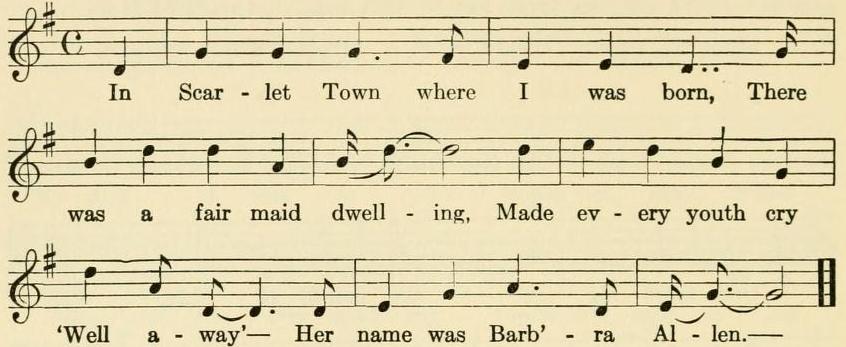Barb'ra Allen- Beaker (NC) c.1939 Brown FF
[My title. Text given with music from the Brown Collection; Volume 4, 1957. The Brown editors' notes follow.
R. Matteson 2015]
27. Bonny Barbara Allan (Child 84)
Of all the ballads in the Child collection this is easily the most widely known and sung, both in the old country and in America. Scarcely a single regional gathering of ballads but has it, and it has been published in unnumbered popular songbooks. See BSM 60-1. Mrs. Eckstorm in a letter written in 1940 informed me that she and Barry had satisfied themselves, before Barry's death, that as sung by Mrs. Knipp to the delight of Samuel Pepys in 1666 it was not a stage song at all but a libel on Barbara Villiers and her relations with Charles II; but so far as I know the details of their argument have never been published. The numerous texts in the North Carolina collection may conveniently be grouped according to the setting in three divisions: (1) those that begin in the first person of Barbara's lover (or at least of the narrator), (2) those that begin with a springtime setting, and (3) those that begin with an autumnal setting. Of course those in group 1 may also have either the springtime or the autumnal setting. The rose-and-brier ending is likely to be attached to any of the texts. The lover's bequests to Barbara, a feature not infrequent in modern British versions but unusual in America, appears once in the North Carolina texts, in F. The first person of the lover commonly is dropped after the opening stanza, but in F it holds through four stanzas. Not all of the texts are given in full.
FF. 'Barb'ra Allen.' Sung by H. J. Beaker. Recorded in August 1939, 1940, or 1941. No place given. There is partial but considerable similarity with 27GG and the Horton Barker versions. Cf. also 27A(i), 27A(4), as well as 27S(i).

For melodic relationship of. **SCB 132, version B; BSM 62, version G; SharpK i 191, No. 24I, and 195, N, measures 5-7 similar to our 3-5; TBV 577, No. 24G, similar beginning; SFSEA 150, No. 131; and MSHF 6. Scale: Hexatonic (4), plagal. Tonal Center: g. Structure: abed (2,2,2,2).
1. In Scarlet Town where I was born,
There was a fair maid dwelling,
Made every youth cry, "well away,"
her name was Barb'ra Allen.
2 It was all in the month of June,
All things there were bloomin'.
Sweet William lay on his death bed
For the love of Barb'ra Allen.
3 And death was painted on his face,
O'er his heart was stealin'.
Oh, hasten away to comfort him,
O lovely Barb'ra Allen.
4 He sent his servant to the town
Where Barb'ra was a dwellin'.
'My Master's sick and sends for you,
If your name be Barb'ra Allen.'
5 Slowly, slowly she got up,
Slowly she came nigh him.
And all she said when she got there,
'Young man, I think you're dyin'.'
6 'Oh, I am sick, very sick,
Death on me is stealin'.
No better, no better I never can be
If I can't have Barb'ra Allen.'
7 'Oh, yes you're sick, very sick,
Death on you is stealin',
No better, no better you never can be
For you can't have Barb'ra Allen.'
8 'Oh, don't you remember in yonder town
You were at the tavern.
You drank a health to the ladies all around,
But slighted Barb'ra Allen.'
9 As she was on her highway home,
The birds they kept a-singing'.
They sang so clear and seemed to say,
'Hard-hearted Barb'ra Allen.'
10 She looked to the east, she looked to the west
And spied his corpse a-comin'.
'Lay, lay down that corpse o' clay
That I may look upon him.'
11 'Oh, mother, oh, mother, go make my bed,
Make it long and narrow.
Sweet William died for pure, pure love,
And I shall die for sorrow.'
12 She was buried in the old church yard,
He was buried nigh her.
On William's grave there grew a red rose,
On Barb'ra's grew green briers.
13 The rose and the brier they grew so high
They could grow no higher.
They met and formed a true love-knot,
The rose wrapt around the brier.